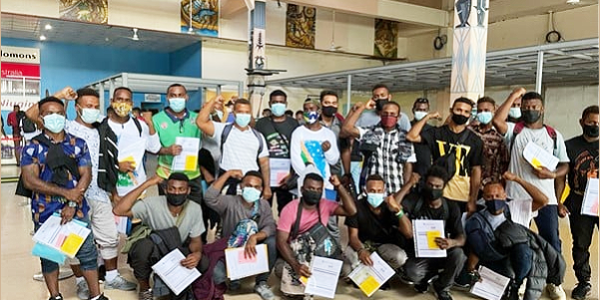A WORLD Bank report urges Solomon Islands government to invest in education to fully realize the benefits of labor mobility and long-term migration overseas.
The report, titled Solomon Islands: Country Economic Memorandum – Unlocking New Sources of Economic Growth, was launched in Honiara on Wednesday.
It highlights key barriers to sustainable economic development, focusing on challenges related to economic geography and private sector growth.
The report, conducted between February 2023 and March 2024, also examines constraints in high-growth sectors such as agriculture, fisheries, tourism, and labor mobility.
The report emphasizes that to capitalize on labor mobility and long-term migration, a robust educational system, workforce training, and improved governance are essential.
“As demand grows for higher-skilled workers, the government must invest in quality primary and secondary education, enhance teaching, prioritize first-language learning, and improve parental support,” the report states.
Additionally, the report highlights that even low-skilled workers need training in soft skills, basic literacy, financial management, cultural awareness, and professional workplace behavior to thrive in overseas markets.
It also calls for measures to mitigate the negative impacts of labor mobility programs, such as improved health insurance and family support services, as well as enhancing the capacity of the Labour Management Unit.
The report advocates for a strategic approach to emigration and recommends building a social protection and jobs system to further boost economic growth.
It also notes that participation in temporary labor mobility schemes, which have increased significantly in recent years, offers economic gains by absorbing surplus labor, increasing remittances, and improving skills.
Remittances from overseas workers, particularly those in Australia and New Zealand, have been a vital source of economic support for Solomon Islands households.
The Central Bank of Solomon Islands estimated that seasonal workers sent home $247 million in 2023, a significant increase from the $182 million in 2022.
These funds are used primarily for essential household expenses, education, and supporting entrepreneurial ventures.
The World Bank report points out that participating in seasonal worker programs improves farming techniques, organizational skills, and financial management.
Long-term emigration, meanwhile, fosters knowledge transfer, government accountability, and higher education incentives.
Australia is playing a key role in upskilling Solomon Islanders, notably by offering a Certificate III in Individual Support (Ageing) in Honiara.
Launched in July, the program includes four months of classroom training followed by two months of practical training in Fiji.
This initiative, which is part of the Australia Pacific Training Coalition (APTC), aims to prepare Solomon Islanders for jobs in Australia’s aged care sector.
So far, Australia has trained around 100 Solomon Islanders in aged care.
Currently, there are about 6,800 Solomon Islanders working under the Pacific Australia Labor Mobility (PALM) scheme, with an additional 7,000 awaiting recruitment.
Prime Minister Jeremiah Manele projects that by 2028, there will be 16,000 Solomon Islanders employed in Australia under the PALM scheme.
However, the local job market faces challenges.
With 22,000–24,000 young people entering the workforce each year and only 3,000–4,000 jobs available, approximately 18,000–20,000 youths join the ranks of the unemployed annually.
To address this, the government is reviewing its Labor Mobility Policy and Strategy 2019-2023 to better manage labor mobility opportunities and protect both workers and domestic industries.
By EDDIE OSIFELO
Solomon Star, Honiara









